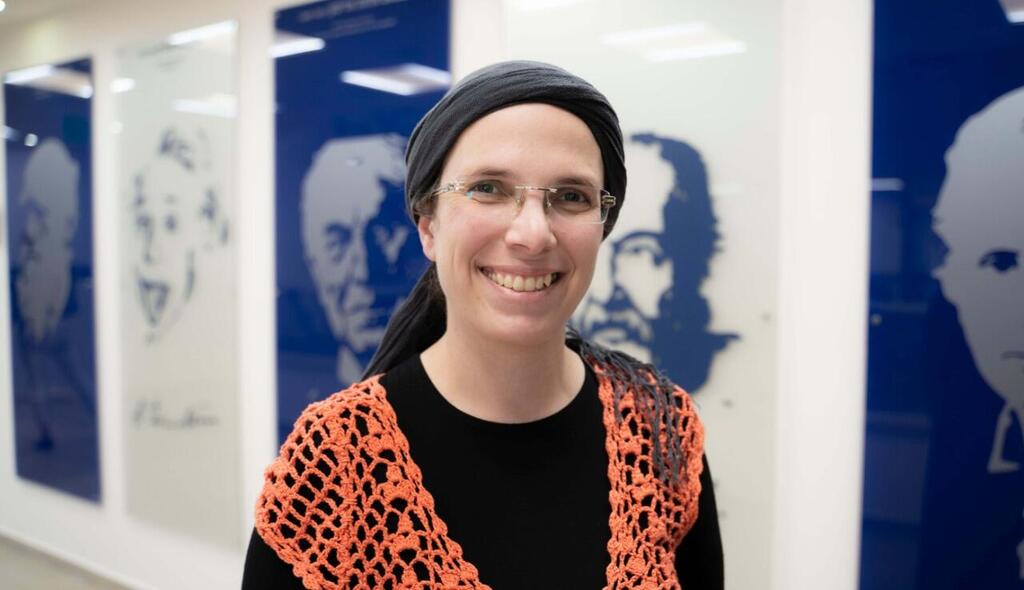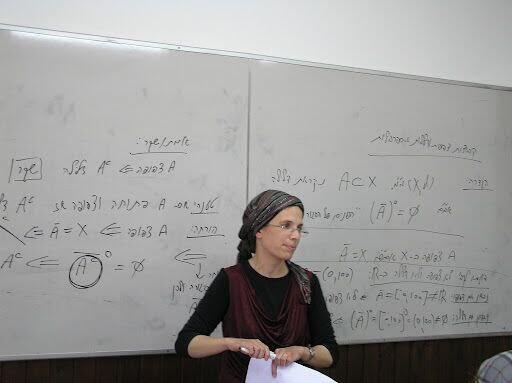Getting your Trinity Audio player ready...
Dr. Chaya Keller from the School of Computer Science at Ariel University is an example of a real superhero. Aside from her research, she is also a mother of 11 children which did not prevent her from continuing her significant work. She received the prize alongside nine additional researchers from various academic institutions in Israel.
Dr. Keller's extensive and impressive research achievements are recognized globally. Her work provides mathematical insights. Examples include cellular antenna spectrum research, to ensure optimal cellular reception everywhere, or research meant to locate COVID patients while maintaining the patients' private information.
Dr. Keller was part of an international team that managed to solve the Ringel problem, a mathematical problem in graph theory that had remained unsolved for 60 years. The team proved that no finite number of colors is sufficient to color every set of circles on the plane, such that every two tangent circles are colored differently.
I try to separate the time devoted to family and children from the time dedicated to research because I've learned from experience that trying to do both simultaneously mainly results in frustration
Among her other achievements is her work on Krasnoselskii numbers and geometric graph theory. "I try to separate the time devoted to family and children from the time dedicated to research because I've learned from experience that trying to do both simultaneously mainly results in frustration," she said.
Dr. Keller, married to Prof. Nathan Keller, a mathematician from Bar Ilan University, added: "Most of my research work is done in the morning (while the children are at school) at night, or on days when I am at the university and my husband is with the children. An important part of my research deals with theoretical mathematics, focusing on symmetry. This field has flourished in recent years and has found applications in various branches of mathematics. I believe it should also have practical applications. For example, in communication technology."
Dr. Keller holds a Bachelor's degree from Bayit Vegan College in Jerusalem, a Master's and doctoral degrees from the Hebrew University in Jerusalem, a postdoctoral degree from Ben Gurion University, and is a research fellow at the Technion. She is a faculty member at the School of Computer Science at Ariel University. Dr. Keller has also been involved in helping girls pursue mathematics studies and building teacher training courses for mathematics.
In fact, Dr. Keller continues a family tradition of winning the Kiril Prize, as her husband won it in 2014. "Our research fields are not very distant, so we enjoy sharing the details of each other's research, not just its outcome. In addition, we once collaborated during the COVID lockdown, working together via Zoom with five colleagues from various universities in the country. It was a bit challenging with all the children at home, and a few geometric models we built ourselves from Lego bricks as part of the problem modeling we worked on served as an attraction for our children during that time," Dr. Keller recounted.
The Kiril Prize is awarded annually by the Wolf Foundation to promising young Israeli researchers who have demonstrated significant research breakthroughs and are expected to lead research and academia in Israel in the future in the scientific fields such as life sciences and medicine, engineering, and agriculture. The prize represents a significant professional milestone in the researcher's academic development, thus holding high prestige in Israel. Since 2005, the Kiril Prizes (each worth $10,000) have been awarded to 171 researchers.
The Krill Prizes for Excellence in Scientific Research, presented by the Wolf Foundation in collaboration with the Krill family, have been a prestigious annual recognition since 2005. These prizes, established in memory and honor of the late Benjamin and Gitla Krill Mansbach Schlanger, aim to celebrate and support exceptional academic faculty members and promising researchers from Israeli research universities.
"The Wolf Foundation is proud to award the Krill Prizes, which constitute an important contribution to recognizing the importance of promoting scientific excellence in Israeli society. Today, more than ever, there is immense importance in nurturing and preserving renowned young researchers in their fields and preventing the escape of brilliant minds to international research universities. Recognizing them as the promising researchers' squad is a direct investment in their scientific breakthroughs," said the CEO of the Wolf Foundation, Reut Inon-Berman.
Alongside Dr. Keller, the coveted prize for 2024 was also awarded to Dr. Yoav Livneh from the Weizmann Institute of Science, who linked neuronal mechanisms in the brain to the development of eating disorders, anxiety, and depression; Dr. Neta Shlezinger from the Hebrew University, who developed innovative methods to combat deadly fungi in the human body; Dr. Yaniv Romano from the Technion, who developed algorithms for estimating information reliability; Dr. Itamar Harel from the Hebrew University, who built a unique model which delays the aging process; Dr. Mor Nitzan from the Hebrew University for her research advancing the understanding and control of collective tissue behavior, and exposing various aspects of cell activity in health and disease states; Dr. Renana Gershoni-Poranne from the Technion for her work in organic-physical chemistry and artificial intelligence; Dr. Hila Peleg from the Technion for significant contributions to the development of tools that enhance productivity and reliability in writing code; Dr. Raya Sorkin from Tel Aviv University for her significant contributions to understanding protein roles in cell membrane and Dr. Nir Shlezinger from Ben Gurion University for his groundbreaking work in machine learning, signal processing, communication, and information theory.



